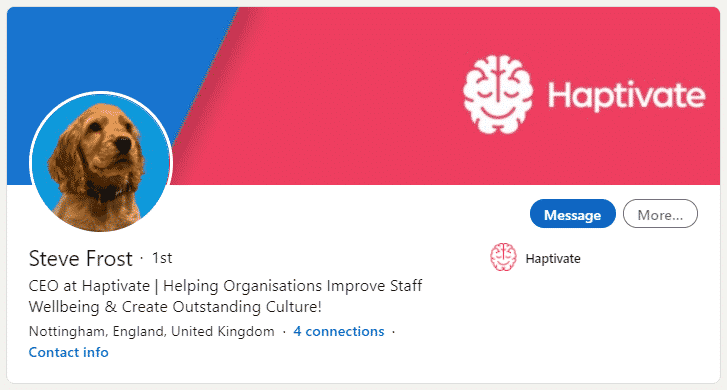Lessons in canine wellbeing strategy
What we learned about wellbeing at work after putting a dog in charge of our company for the week

At first, putting a dog in charge of our company seemed like an absolutely flawless idea. We humans have a tendency to overcomplicate, well, everything. And who knows more about happiness than man’s best friend?
With Blue Monday falling in a third UK lockdown, we decided we’d all had enough and took the decision to hand over the reins of Haptivate to Aysha’s dog. Steve Frost to be exact:

Of course, things quickly descended into chaos when Steve decided that he preferred playing in the snow to tackling the daily trials and tribulations of life as CEO. We’re trying not to take it personally, and instead adopting a growth mindset about the entire debacle.
So what are some of the key insights we’ve learned from Steve’s brief stint as our glorious leader?
Let’s take a look through Steve’s various cultural decrees from throughout the week – and why the research suggests that they might not be quite as barking as they sound!
Quick Links
1. Everyone To Be Told They’re A Good Boy/Girl 😊
While it’s highly advisable to adopt alternative phrasing, recognising others for their work and achievement does wonders for team relationships and performance.
When people feel appreciated, oxytocin is released in the brain – a natural painkiller that helps build trust and social bonds.
Employees that feel a strong sense of trust at work are more energetic, engaged, productive and loyal.
At an organisational level, companies that get recognition right have 46% lower voluntary turnover rates and employee performance that’s 12-15% higher.

2. Frequent Celebratory Zoomies 🎉
If you’re looking to boost employee motivation, a great question to ask is “do we celebrate often enough at work?”
When we reach goals, the pleasure chemical dopamine is released in the brain.
Chasing the rush of pleasure this creates is a huge part of what drives our motivation.
Celebrating small wins along the way to lofty goals, keeps the dopamine flowing and creates a positive feedback loop, spurring us on to the next milestone.
Research by Amabile and Kramer has found “of all the factors that induce creativity, productivity, collegiality, and commitment among employees, the single most important one is a sense of making progress on meaningful work.”
The key to this is to put some structure around it and either add it to your to-do list or delegate this task to someone to be in charge of. For example, why not take a moment consider the following questions:
- How can you make time in your week to recognise your own achievements?
- How will you celebrate?
- How can you recognise achievements within your team?
- How does your organisation like to celebrate?

3. Be Grateful To Hoomans 🙏
Have you ever seen the look on a dog’s face when you pick up a ball to play with them – it’s like you’re doing the greatest thing anyone has ever done for someone in the history of the world – possibly the universe.
While homosapiens are undoubtedly tougher to please, we’d be doing ourselves a huge favour if we started to pay closer attention to the little things we can be grateful for.
Gratitude is another huge oxytocin booster with an enormous host of benefits including reducing stress, increasing positivity and improving task productivity.
Practicing gratitude regularly has been shown to make employees more empathetic and pro-social, while being on the receiving end of gratitude has been shown to inspire acts of kindness and organisational citizenship.
So take a few minutes out of your day or your week to pause and think about how you show gratitude to your fellow humans!

4. Daily Walkies 🏃
Dogs are great at listening to their bodies and prioritising its basic need for movement, while us humans can find this more difficult.
Having a routine where you regularly get up from your desk, stretch your legs and get a change of scenery is important for both physical and mental health.
When walking or running, our brains can access its default mode network (basically putting the mind on autopilot) which can help us to see things from a new perspective. This can be helpful if we need to be creative, make a decision, or process recent events.
It isn’t psychologically sustainable to try to maintain a laser-like focus all the time. Sometimes we need to take a break, recharge and rekindle our inspiration. Sometimes a time-out is all we need to find a crucial solution to a work challenge that we would otherwise have overlooked.

5. Regular Naps Encouraged 💤
We all need time to recharge, especially during periods of stress. Dogs take time off whenever they need it while we might feel more inclined to power through and risk burnout.
While we currently don’t have any canine clients, I’m almost certain they don’t sit there worrying about what other people will think if they rest their eyes for a few moments.
However, we can often be our own worst enemy when it comes to sleep. Due to the brain-body link, our worrisome thoughts tend to release stress chemicals in the body which keep us awake.
The truth is, we need to feel a sense of safety in order to truly rest. We provide that security for our dogs. So it’s important that friends, family and colleagues can have each other’s backs when someone needs to take a break to recharge.
Rest activates our parasympathetic nervous system, helps us reach the biologically balanced state of homeostasis and strengthens our immune system as the body’s cells undergo essential maintenance.
Rest also brings cognitive benefits. For example, people who nap after learning new things are more likely to commit the new information to memory. During periods of turbulence, change and adaptation, it’s extra important to prioritise rest to help us adjust to our circumstances.

6. NO SQUIRRELS ALLOWED 🚫
While we don’t have any research studies to support this, we can only assume that releasing squirrels in the workplace can have detrimental effects on both wellbeing and productivity. With the benefit of hindsight, we have to give Steve credit for bringing an important business risk, that we’d so far overlooked, to our attention.

That’s a wrap...
While we’re truly grateful that everything Steve has done for Haptivate this week, we’ve decided it would be for the best if he were to step back into his previous role of Chief Distraction Officer. We wish him all the best and will keep sure to keep you posted on the Haptivate Instagram as he resumes his important duties in this key area.
But if you’re ever looking for new ways to make the working day a little bit happier and in need of some inspiration, asking yourself “What would a dog do?” might be less preposterous than it sounds!

James Pacey
Co-founder & Commercial Director, Haptivate


